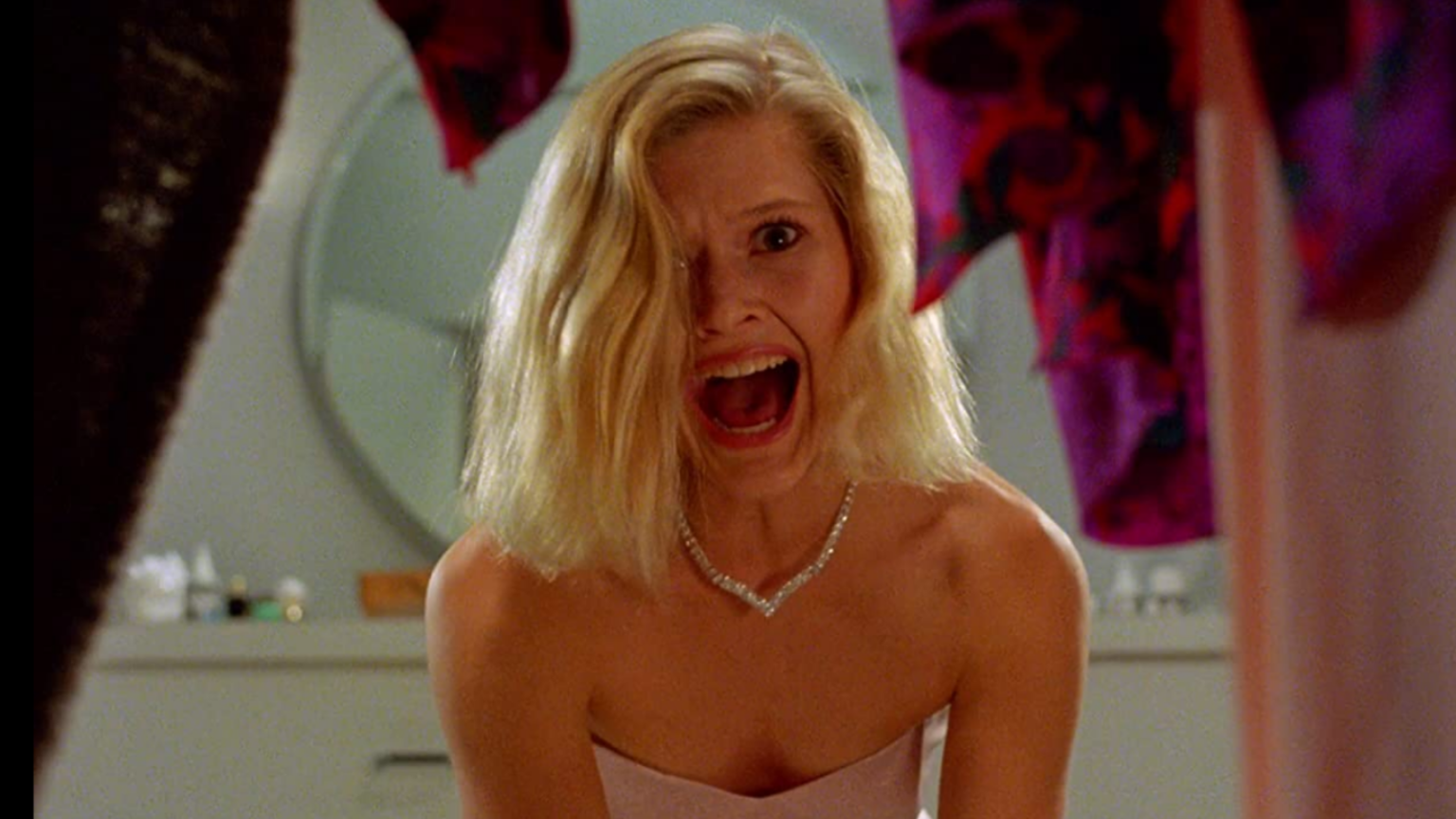Society begins with a series of promises.
A teen boy – Bill Whitney, played by future Baywatch heartthrob Billy Warlock – stumbles through a darkened Beverly Hills mansion, breathing heavily, drenched in sweat, kitchen knife clutched close to his chest.
Bill confesses to his therapist that he feels as though he’s on the cusp of discovering something nightmarish festering just beneath the surface of his life. He bites into an apple and sees a dense cluster of worms wriggling around its core.
Then, the film’s opening credits, superimposed over footage of a writhing, glistening mass of flesh. Various shapes flit in and out of focus – an arm here, a head there – but they never cohere into anything recognizably human.
The other shoe won’t drop for about eighty more minutes.
One could be forgiven for not knowing what they’re meant to expect from Society, even with the film well underway. It’s a body horror vehicle, yes, but one wrapped in so many layers of patently facetious teenage drama that it feels more John Hughes than David Cronenberg. Following the rhythmic shocks of the film’s opening, we’re given a comparably tame glimpse into Bill’s life, which hits all the expected beats of a teen coming-of-age flick with winking precision. Girlfriend problems, school elections, competitive house party invitations–all are contrived to the point of surreality. Before long, Bill begins noticing the seams, and his paranoia mounts.
His emotional distance from his affluent family – mother, father, and sister – is particularly gnawing. He can’t shake the sense that something is deeply wrong, between their cavalier reactions to tragedy, their dogmatic adherence to the formalities of upper class life, and the borderline incestuous tone of their conversations. One word in particular keeps cropping up: “society.” Defined by Bill’s relatives and acquaintances as a supposed Eden that will sponge away all his troubles (should he prove useful to it), and defined by the film as an orgiastic carnival of social parasitism and sexual violence.
Society is wonderfully unsubtle. Any and all implications of its stock (yet intimately relatable) premise – an adolescent feeling at odds with his surroundings, and being forced to confront the uncomfortable truths of how the world works – are bolded, highlighted, and triple-underlined. Eventually, after a great deal of playful carrot-dangling, the teen drama veneer is stripped away entirely to make way for the film’s infamously grotesque final act. In an instant, subtext is brazenly elevated to text. “Contributing to society” becomes a literal, shockingly visceral act of consumption. This is not a metaphor so much as it is an elimination of finer details: here is the truth of the thing, exposed.
And the vulgarity is the point. Society stubbornly rejects nuance in both the systems and figures it implicates, because why wouldn’t it? The end result is the same. The rich siphon money and resources from the poor, perpetuating power in all its depraved permutations as their victims drop like flies. It’s tempting to read the film – released in 1989 – as a direct response to Reaganism, and while this is no doubt a factor, Society speaks more broadly than that. Its stripped-down, no-nonsense philosophizing ensures that its relevance will only compound so long as these same cogs grind along unfettered.
Of course, the film’s most immediate draw is its special effects work, and without going into excessive detail – both so as not to spoil anything, and because words could hardly do these images justice – it delivers. Society was helmed by Brian Yuzna in his directorial debut, while effects (specifically, to quote the film’s opening credits, “Surrealistic Make-Up Effects”) were handled by one Joji Tani, under his longtime moniker “Screaming Mad George.” Yuzna had previously served as co-producer on cult comedy-horror favorite Re-Animator, and George’s effects credits included, most notably, Big Trouble in Little China and Predator; their collaboration here is suitably demented. Even as Society’s moral urgency is brought to the fore, it’s anything but self-serious. The visual payoff is every bit as indulgent as the narrative one, and the setpieces and creature concepts, clearly crafted and executed with abject glee, frequently toe the line between vomit-in-your-mouth disgusting and laugh-out-loud absurd.
It’s this bizarre friction that ultimately gives Society staying power. Despite being politically charged and thuddingly obvious, the film never condescends. Horror is at its worst when it becomes airlessly invested in its own importance; Yuzna thankfully refuses to sacrifice fun on the altar of his message. The two, instead, are mixed into a volatile chemical compound that sublimates social critique into sheer momentum. We don’t need Society to explain itself to us because it’s here, it’s appalling, it’s laughable, it’s immediate. The rich are eating us. Eat them back!




